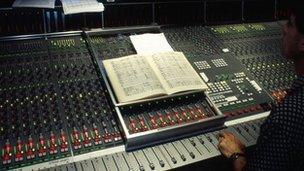Musicians end 'strike' on Radio Cymru over 'pitiful' payments
- Published

The musicians say royalties should be based on 'economic value' not 'reach and consumption'
Musicians in Wales have called off their protest against what they call "pitiful" sums paid by the BBC for broadcasting music on Radio Cymru.
The problems arose when the Performing Right Society (PRS) changed the way it collected royalty payments.
The Welsh Musicians' Alliance revoked permission for Radio Cymru to play their music on Monday but called off plans for another two days' protest.
PRS said it regretted the action but sought "dialogue" with Welsh musicians.
Dafydd Roberts from Sain Records confirmed on Monday evening that the following two days of action planned by the alliance had been called off following talks with Radio Cymru.
He said that the decision by PRS and the BBC to include the "economic value" of their payments on the agenda for a meeting on 12 January was crucial in the musicians' decision to call off the protest.
Mr Roberts added that it was not yet the end of the matter, and that the musicians would be reviewing their position in the new year following the meeting.
'Fair pay'
The dispute arose following a change in the way the PRS collected and distributed royalty payments.
PRS said that under the current formula for collecting royalty payments musicians get 59p per minute when their music is played on Radio Cymru. Previously it was 89p per minute.
The musicians said the amounts they were now paid was "pitiful".
Earlier, Deian ap Rhisiart, from the Welsh Music Publishers and Composers Alliance, said: "We are very disappointed with the corporation's response to our first strike held earlier this year on 1 March, when the majority of our members revoked their permission for Radio Cymru to play their songs.
"They have a duty, according to the BBC's charter, to be responsible for the stewardship of public funds, and therefore questioning their blanket payments to the PRS.
"We demand a change to this system, so that composers in Wales receive fair pay for the broadcasting of their works," he added.
"For three years now, musicians have been forced to pursue other professions since there is no money in the music industry to make a living, and we feel that this endangers the whole future of Welsh language music and we have no other option but to strike," he added.
'Prejudiced' rules
Plaid Cymru MP Hywel Williams called for the PRS to review their "downgrading" of Radio Cymru and to pay a proper rate for the airplay of Welsh language artists.
"Radio Cymru is a national station and the main output for Welsh language musicians but the PRS formula fails to recognise this.
"Welsh language music is unlikely to be played on any UK-wide station and so these rules are prejudiced against those who create their work in Welsh," he said.
The BBC said the protest was "a great disappointment... after days of negotiations and a proposal which answered the vast majority of the musicians' requests".
Radio Cymru said it was amending the music it played on Monday to respect the wishes of the musicians as far as possible, but warned that the situation could not be maintained for three days.
"This is not an official strike and - as the music has been licensed to the BBC by PRS - there is no legal impediment to the playing of the music in questions by Radio Cymru," it said.
'Strong supporters'
Sian Gwynedd, editor of Radio Cymru added: "As a station, we are very strong supporters of Welsh musicians and we are proud of the creative partnerships we have with musicians in Wales."
Mark Lawrence, the director of membership with PRS For Music said the rates paid for radio play was reviewed constantly "based on audience, reach and sampling work our teams do".
"A specific payment for Welsh language music played in public was introduced in 2010 but it is true that more accurate analysis of music used has led to lower payments overall for many Welsh members.
"Whilst we understand and appreciate the difficulties facing Welsh language music, PRS for Music is committed to fairness and accuracy in its distributions to all members whatever their genre."
A meeting is planned for the new year.
"We look forward to meeting all parties to find a way forward so that Welsh language music can continue to be made and enjoyed," he added.
- Published9 October 2010